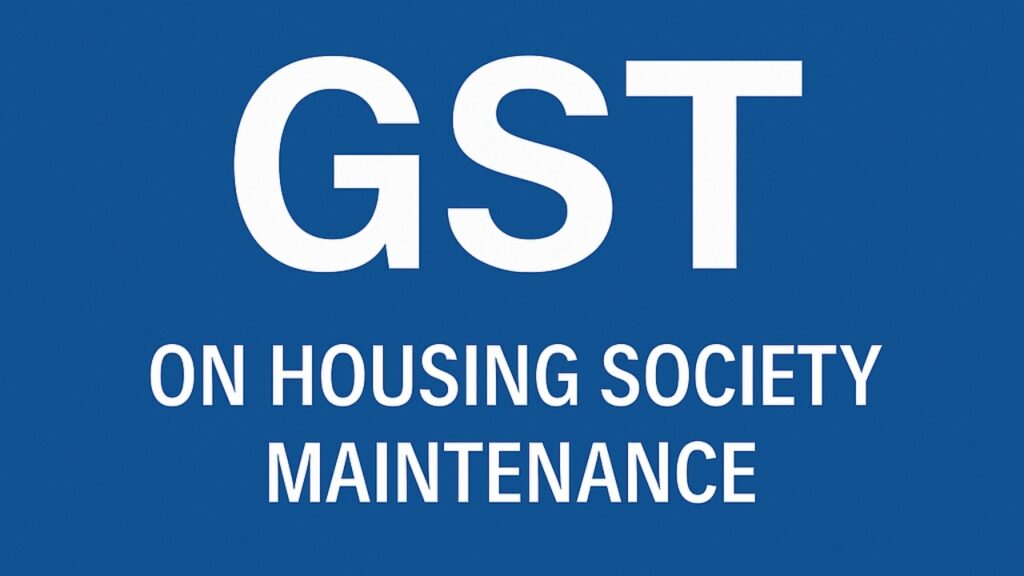GST on Apartment Maintenance Fees: What Every Home Owner Should Know
Why is there confusion amongst apartment owners
There have always been doubts among apartment residents in India as to whether they need to pay the GST on maintenance charges collected by their housing societies.
Things have been further complicated by the fact that there was doubt whether GST was to be levied on the full amount of their maintenance bill, or only on the amount above ₹7,500. Recently, the Central Board of Indirect Taxes and Customs (CBIC) issued a clarification: a resident pays more than ₹7,500 monthly in maintenance; also, if the society’s yearly revenue goes beyond ₹20 lakh, then the entire amount paid on account of maintenance is subjected to GST-not only the portion above ₹7,500.
What the rules say
This is not a new provision. Tax experts, including Deepak Kumar Jain from TaxManager.in, pointed out that the same message was earlier conveyed to the people by the government in the year 2019. That earlier announcement stated that if the monthly payment stay below ₹7,500 per flat, no GST is required, even if the society’s total revenue is very high.
The ₹7,500 threshold was created in 2018 and replaced the previous figure of ₹5,000. Therefore being current rules if both conditions are satisfied, namely, the monthly charge exceeds ₹7,500 and the society does not have revenue crossing ₹20 lakh, it changes the maintenance fees into a taxable one, and GST needs to be collected from residents on the entire sum.
A very important court verdict that alters things
The CBIC cleared its stand, but the Kerala High Court has recently come out with a verdict in favor of the apartment-dwellers and societies. In a historical judgment in April 2025, the High Court invalidated the 2021 amendment of the GST law whereby it sought to make transactions between clubs or societies with their members taxable.
The court maintained it was unconstitutional as these transactions are not constituted with two different entities, a foundation base of tax valid under the Constitution.
The Indian Medical Association raised the matter, contesting a tax on doing anything for their own members. The court agreed with them, advocating mutuality, that a group and its stakeholders are not separate in this case. This verdict echoed a Supreme Court judgment delivered earlier in 2019 in the matter of Calcutta Club.
What tax experts have to say
Legal tax experts now vigorously contest what this ruling could mean for housing societies in India. There are some people who believe this would mean that societies will not be liable to pay GST because the members and society are synonymous.
However, others warn that it would be better not to change the way such taxes are levied until the Supreme Court gives its pronouncement on the matter. So in line with this, societies should now encompass their members in keeping records for taxes.
This could mean that societies no longer have to pay GST as members and society are the same for this purpose. Others, however, caution that it would be better not to change anything about the collection of amounts like that until the Supreme Court decides on the issue. But that is just a relative benefit in which the societies will now have to include their members in tax records.
The reported reactions of homeowners
Most people who own apartments, especially those living in cities like Mumbai and Bengaluru, feel irritated at the new tax provisions. They find it unfair that maintenance charges are subject to 18% GST where a part of such fees pays for basic services like electricity and water judicially.
In one building, monthly utility bills could reach as much as 2 lakhs. Therefore, they are not luxuries; they are essential needs and taxing them adds to the burden of middle-class families already stretched thin.
Some even fear that this policy will also result in more and more societies opting for the cash route to avoid taxes which may sketch out a non-transparent environment around this. Others call for a relook on the entire GST on housing maintenance, stating that it was high time this distinction was made as these payments were not a commercial transaction but the cost of living under one roof.
Read the other News
Gold Update : See the updated rates of Gold in your City
Weather Update: Red Alert for heat strokes in Delhi ,Indore,Rajasthan
Top 3 Ford Cars below Rs 7 Lakhs – Fun to Drive and Value for Money – All Details
Follow us on the WhatsApp Channel

